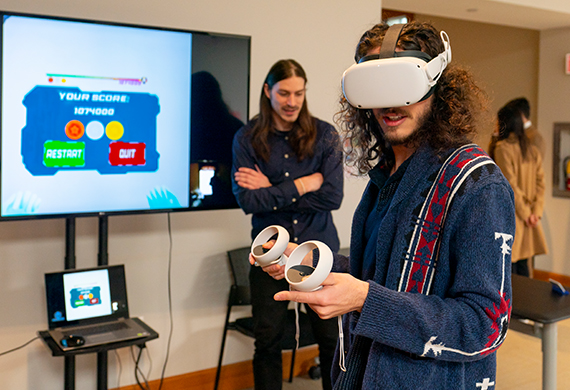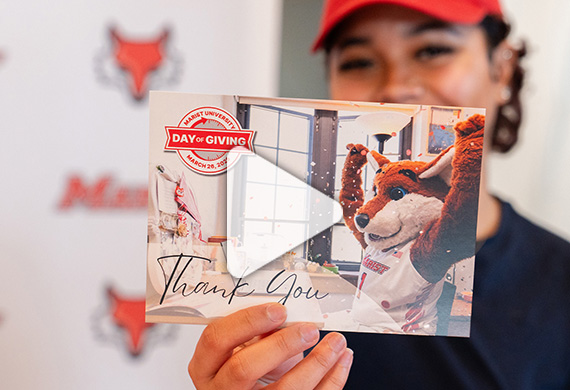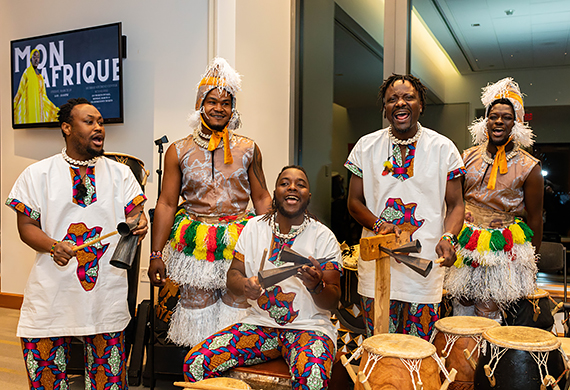Marist Students Enjoy Expanded Research and Mentorship Opportunities

Marist’s membership in the Council on Undergraduate Research opens doors for everyone.
February 4, 2020—In late 2019, Marist’s Office of Academic Affairs announced the College’s institutional membership in the Council on Undergraduate Research (CUR). Marist has had a longstanding partnership with CUR for faculty, but new benefits are now extended to all members of the Marist community.
What does it mean? Marist students, regardless of academic school or program, now have full and complimentary access to the Registry of Undergraduate Researchers, free registration for CUR webinars, reduced fees for attending CUR-Dialogues and CUR-Conferences, and a subscription to the peer-reviewed journal Scholarship and Practice of Undergraduate Research. Registering for an account is as simple as signing up with a Marist email address. In just a few clicks, students can learn about upcoming research opportunities, make connections with other students and researchers around the globe, and be inspired to follow their passions.
Dr. James Snyder, Associate Professor of Philosophy and Interim Dean of Academic Engagement, facilitated Marist’s enhanced institutional membership with CUR and is passionate about providing high-impact learning opportunities to all undergraduates. Snyder served as Honors Program Director for five years, and during this time he oversaw an expansion of undergraduate research to include hundreds of credit-bearing undergraduate research projects a year. In this interview, Snyder explains the importance of undergraduate research, the unique role mentorship plays at Marist, and why he believes the College’s Triangle Approach to learning produces thoughtful and reflective graduates in all disciplines.
Why should students be interested in the benefits CUR provides?
James Snyder: Not only are the CUR benefits grounded in sound educational practice, it’s what the graduate school and the job market are demanding. In a recent national survey by Hart Research Associates, 87 percent of employers indicated they were more likely to hire college graduates who had completed research-based projects. Studies also show that having a faculty research mentor is associated with increased workplace engagement and even long-term happiness. Whether it’s working alongside a faculty member as part of a grant-funded research team or developing and executing a research proposal from scratch, hiring managers want to see that students have engaged in a long-term project that excites them. The College wants students to be successful in the classroom and after graduation, and CUR is an excellent resource.
How do Marist students typically get involved in research projects?
JS: Students usually approach a professor whose expertise is in a subject they’re curious about. Fortunately, Marist’s small class sizes make it easy for relationships to develop between faculty and students. The First Year Seminar is specifically designed with forging connections between students and faculty, and building the research skills necessary for upper-level projects. We also encourage students to attend faculty office hours and talk about their interests. Marist faculty receive specialized training in mentorship and can give practical advice to students at every stage of their journey. Also, faculty mentors can help students explore designing a personalized credit-bearing class, called an independent study, to take their learning to a higher level.
Marist’s Honors Program is unique because it places such a strong emphasis on supporting mentoring and research. Can you explain Marist’s approach?
JS: At Marist, 10 percent of the student body participates in the Honors Program, but having a faculty mentor and engaging in research projects is not limited to this group. All Marist students are required to complete a Capstone project their senior year, and this is an excellent opportunity for students to dig into the research process. Capstone projects can be as broad as a student’s imagination. Past projects have ranged from fashion design students creating a runway collection to business administration majors developing strategic management plans for a company of their choosing. Because the projects are designed by the student with input from their faculty advisor and mentors, the experience is highly individualized and focused on the student’s area of interest. Faculty mentors are central to successful undergraduate research, and we foster a culture of mentoring on our campus in many ways. Our Center for Teaching Excellence plays an important role in training and supporting our faculty as research mentors.
How does this focus on research and mentorship tie in with Marist’s interdisciplinary Triangle Approach to learning?
JS: Marist’s “Triangle Approach” utilizes the guidance of mentorship to help students pursue a strategic combination of studies. For example, a student might choose to have a major and two minors, or a double major with a minor. An English major who wants to write about environmental issues might add minors in environmental studies and public relations or journalism. History majors interested in immigration issues are encouraged to pursue social work and Spanish minors. A political science major with interests in gender equality and the legal profession might consider a minor in Women’s, Gender, and Sexuality Studies and a Paralegal certificate. While students often choose to pursue undergraduate research in the major, many others in fact do research in a minor or an interdisciplinary field of study. These interdisciplinary collaborations further help the student to refine their research and career interests – it’s a very personized process.
What’s your advice for Marist students who are feeling hesitant about finding a faculty mentor or starting a research project?
JS: The advice is straightforward. Establishing a mentoring relationship with a faculty member not only makes you a happier student, but a more successful one and leads to greater career success. At Marist, you have the opportunity to establish mentoring relationships throughout all four years. Just think of all you’ll be able to learn, experience, and accomplish during that time!



